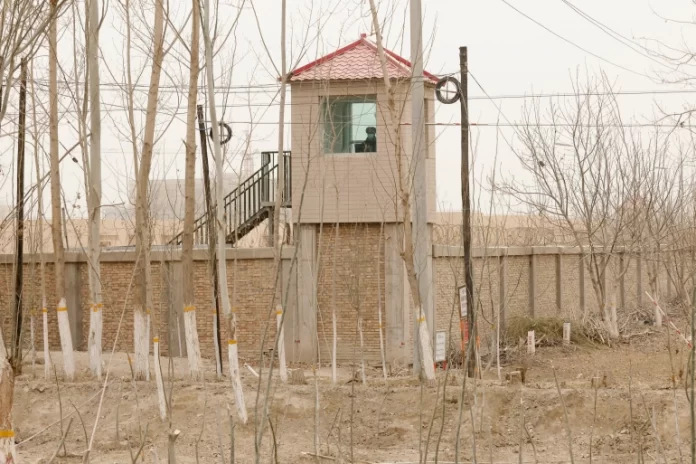
As Beijing seeks to avoid further censure over its policies against the Uighurs and other mostly Muslim minorities, calls grow for tougher action.
Diplomats and human rights advocates are stepping up pressure on the United Nations to act over China’s treatment of the Uighurs and other mostly Muslim ethnic groups, as Beijing tries to head off further scrutiny of what is happening in the northwestern region of Xinjiang.
The call for action took place as world leaders arrived in New York City for the annual United Nations General Assembly (UNGA) meeting, and two weeks after the UN Human Rights Council found in a landmark report that China had potentially committed “crimes against humanity” in Xinjiang.
“Inaction is no longer possible,” Fernand de Varennes, the UN’s special rapporteur on minority rights, said at the forum sponsored by the Atlantic Council and Human Rights Watch. “If we allow this to go unpunished, what kind of message is being propagated?”
Jeffrey Prescott, a deputy US ambassador to the UN, suggested the integrity of the institution was at stake in its response to China.
“How these atrocities are addressed goes ultimately to the credibility of that system, to the credibility of our international system itself,” he said. “It’s deeply disheartening to see a country that has been so central to the creation of the modern UN system, and enjoys its status as a permanent member of the Security Council, so profoundly violating its commitments.”
Since 2018 when the UN Committee on the Elimination of Racial Discrimination first revealed that more than one million people were being held in a network of detention centres across Xinjiang, academics, exiles and the media have uncovered abuses from forced labour to family separation, and the destruction of the Uighurs’ culture and religious identity.
Beijing has acknowledged the existence of the camps, which it says are vocational skills training centres necessary to deal with “extremism”.
It reacted angrily to the release of the Human Rights Council report, calling it “a patchwork of false information” and portraying it as a fabrication cooked up by Western nations and their supporters.
Beijing issued its own 122-page rebuttal, and its diplomats are now lobbying others to try and prevent the possibility of further scrutiny by the council of its campaign in Xinjiang with China’s ambassador in Geneva threatening to withdraw cooperation with the human rights office — without specifying how.
The Human Rights Council is meeting in Geneva while the UNGA holds its annual gathering in New York.
Beijing traditionally looks to the UN, where it can count on support from countries it has befriended and in many cases assisted financially, as a counterweight to US-led blocs such as the G7, which have grown increasingly hostile towards China in recent years.
“China sees the UN as an important forum that it can use to further its strategic interests and goals, and to reform the global order,” said Helena Legarda from the Mercator Institute for China Studies in Berlin.
While holding up the UN as a model of multilateralism, China rejects criticism or decisions that the ruling Communist Party sees as counter to its interests.
Redefining human rights
Michelle Bachelet, the former UN human rights chief, had been pushing since 2018 for “unfettered access” to Xinjiang, but in the end made a highly-controlled visit in May as Beijing pushed hard to block the UN report.
After the rights office finally revealed its findings on August 31, Chinese diplomats spearheaded a joint statement, which it said was backed by 30 countries, including Russia, North Korea, Saudi Arabia and Venezuela, that condemned “disinformation” behind the report and the “erroneous conclusions” it drew.
Like the United States, China feels a certain freedom to ignore UN institutions when it wants: under Donald Trump, the US pulled out of the Human Rights Council in 2018, accusing it of anti-Israel bias, while under Joe Biden it returned to the 47-member body this year.
Also like the US, China leverages its power to get its way, and has effectively stymied a World Health Organisation (WHO) investigation into the origins of COVID-19, which emerged in its central city of Wuhan in late 2019 before sweeping across the world.
Ken Roth, the former executive director of Human Rights Watch, said Chinese President Xi Jinping is trying to redefine what human rights are, in part by casting economic development as a key criterion.
China, Roth said, “more than any government in the past, is trying to undermine the UN human rights system” — by pressuring UN officials, retaliating against witnesses and trying to bribe governments.
“One of their top priorities right now, maybe after Taiwan, is to avoid condemnation by the Human Rights Council,” Roth said. Beijing claims the self-governing island of Taiwan as its own and has not ruled out the use of force to take control of the territory.
Rob Roe, Canada’s ambassador to the United Nations, said China’s reaction to the UN investigation was unsurprising and that new action was required.
“We need to deal with this question. We need to deal with the question of what further sanctions will be required. We need to deal with the question of what further steps could be taken to respond to the extent of this crisis,” he said.
Rayhan Asat, a Uighur lawyer who works for the Atlantic Council and whose brother is imprisoned in Xinjiang, urged the world to insist that action be taken, not just against China but companies that profit from its abuses.
“We should not let the Chinese government off the hook by normalising what the state did,” she said, “because at the end of the day, this is state violence.”
SOURCE: ALJAZEERA AND THE ASSOCIATED PRESS
